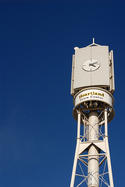Economists, planners and the media often focus on the extremes of real estate — the high-end properties or the foreclosed deserts, particularly in the suburban fringe. Yet to a large extent, they ignore what is arguably the most critical issue: affordability. read more »
Economics
Personal Income in the 2000s: Top and Bottom Ten Metropolitan Areas
The first decade of the new millennium was particularly hard on the US economy. First, there was the recession that followed the attacks of 9/11. That was followed by the housing bust and the resulting Great Financial Crisis, which was the most severe economic decline since the Great Depression. read more »
Middle America: Problems and Prospects
Undoubtedly, America is a middle class nation. But are there problems in the middle? It would certainly seem so: reduced employment, income and wealth (more worryingly, reduced employment, income- and wealth-building opportunities); reduced prospects for generational advancement (kids are supposed to do better than their parents, right?); general feelings of stagnation, “on the wrong track,” pessimism, frustration and anger.
Are these cyclical or structural changes? What are the causes, and what are the cures? read more »
The Next Urban Challenge — And Opportunity
In the next two years, America’s large cities will face the greatest existential crisis in a generation. Municipal bonds are in the tank, having just suffered the worst quarterly performance in more than 16 years, a sign of flagging interest in urban debt. read more »
Agglomeration Vs. Isolation for Science Based Economic Development
Earlier this month President Obama signed the reauthorization of the COMPETES Act, which provides federal funding for science initiatives aimed at enhancing economic competitiveness. In addition to shoring up agencies like the National Science Foundation, the bill called on the Department of Commerce to create a new program charged with supporting the development of research parks and regional innovation clusters. Unheard of before World War II, these entities today represent the cutting edge in what insiders call TBED: technology-based economic development. read more »
Rise of the Hans
When Chinese President Hu Jintao comes to Washington this week, there aren't likely to be many surprises: Hu and Barack Obama will probably keep their conversation to a fairly regulated script, focusing on trade and North Korea and offering the expected viewpoints on both. But seen from a different angle, everything in that conversation could be predicted, not from current events but from longstanding tribal patterns. read more »
Self-Employment Key to Expanding Rural America’s Revival
In many ways, these are the best of times for rural America. Rising commodity prices for food, fiber and energy have revived the economy in much of the nation’s heartland. But still, many rural communities still are losing population, particularly among the young, and suffering unacceptably high rates of poverty. What accounts for this “best of times, worst of times” scenario? read more »
Fuzzy Thinking by Famous Economists
Edward L. Glaeser, in an end-of-year piece for the New York Times, claims that generous housing supply is the reason that Texas’s economy is performing so well. As he says in his final paragraph:
“Housing regulations, more than those that bind standard businesses, explain the Sun Belt’s population growth. If New York and Massachusetts want to stop losing Congressional seats, then they must revisit the rules that make it so difficult to build. High prices show that the demand would be there if the supply is unleashed.”
This can’t be true. read more »
The Heartland Rises
The change in congressional power this week is more than an ideological shift. It ushers in a revival in the political influence of the nation’s heartland, as well as the South.
This contrasts dramatically with the last Congress. Virtually its entire leadership — from former House Speaker Nancy Pelosi (D-Calif.) on down — represented either the urban core or affluent, close-in suburbs of large metropolitan areas. Powerful old lions like Reps. Charles Rangel (D-N.Y.) of Harlem, Henry Waxman (D-Calif.) of Los Angeles and Barney Frank (D-Mass.) of Newton, an affluent, close-in Boston suburb, roamed. The Senate was led by Sen. Harry Reid (D-Nev.), who loyally services Las Vegas casino interests while his lieutenant, Sen. Chuck Schumer (D-N.Y.), is now the top Democratic satrap of Wall Street. read more »
California’s Third Brown Era
Jerry Brown’s no-frills inauguration today as California governor will make headlines, but the meager celebration also marks the restoration of one of the country’s most illustrious political families. Save the Kennedys of Massachusetts no clan has dominated the political life of a major state in modern times than the Browns of California. A member of this old California Irish clan has been in statewide office for most of the past half century; by the end of Jerry Brown’s new term, his third, the family will have inhabited the California chief executive office for a remarkable two full decades since 1958.
Brown, at 72 the oldest governor in state history, may well determine the final legacy of this remarkable family. His biggest challenge will be to reverse the state’s long-term secular decline — a stark contrast to the heady days of the first Brown era, presided over by paterfamilias Edmund “Pat” Brown. read more »






















